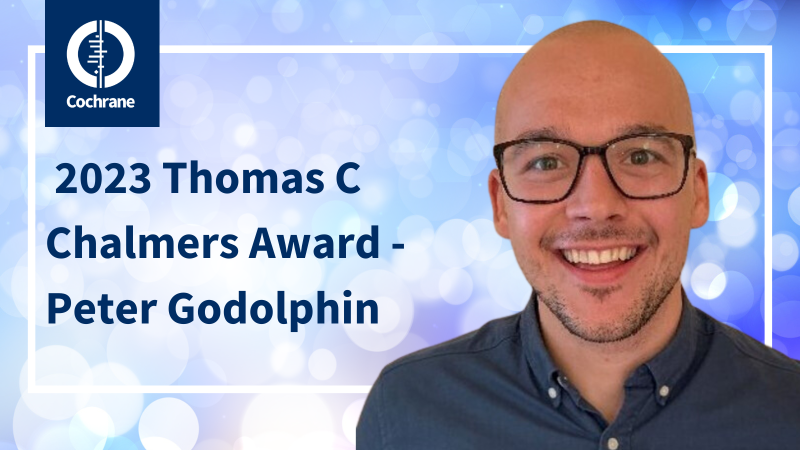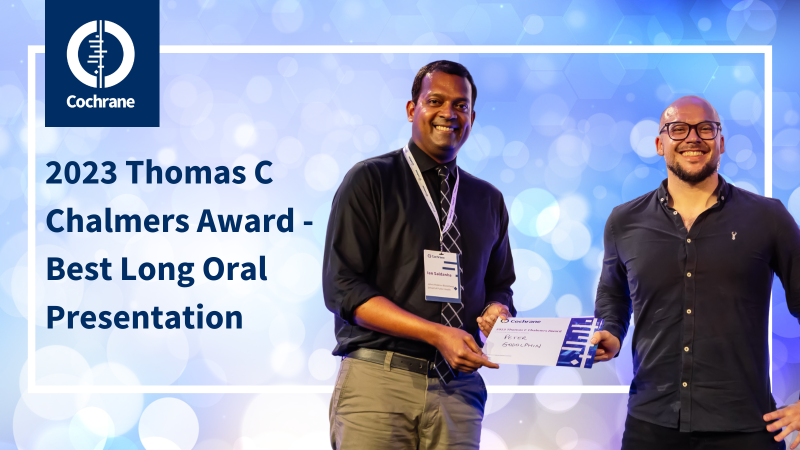
Dr Tom Chalmers was an outspoken advocate of randomised trials, whether at the bedside, at professional meetings, in class or in situations pertaining to his own life. His creativity spanned his entire career, influencing clinicians and methodologists alike. He is perhaps best known for the notion ‘randomise the first patient’, his belief that it is more ethical to randomise patients than to treat them in the absence of good evidence. In his later years, in arguably his most important work, Tom and his colleagues showed that had information from RCTs been systematically and cumulatively synthesised, important treatments such as thrombolytic therapy for myocardial infarction would have been recognised as useful much earlier.
The Thomas C Chalmers Award was initiated by Tom Chalmers himself and further supported with individual donations from friends and family to celebrate and recognise Tom's interests and achievements. The prize is awarded to an early career investigator presenting on methodological issues at the Cochrane Colloquium. The presentations must demonstrate originality of thought, high-quality science, relevance to the advancement of the science of systematic reviews and clarity of presentation.
The Thomas C Chalmers Award for Best Long Oral Presentation goes to Peter Godolphin, Senior research fellow and part of the meta-analysis programme at MRC Clinical Trials Unit at University College London. London, UK.

Peter won for his long oral presentation called ‘Reliably estimating interactions and subgroup effects in aggregate data meta-analysis'
Background: A key question for meta-analysis is to reliably assess whether treatment effects vary across different participant subgroups. Traditionally, these interactions have been estimated using approaches known to induce aggregation bias, so we previously recommended a within-trial approach to provide unbiased estimates for binary or ordered-categorical patient-level treatment-covariate interactions. However, patients, clinicians, and policymakers need reliable estimates of treatment effects within specific covariate subgroups, on relative and absolute scales, in order to target treatments appropriately, which estimation of an interaction effect itself does not provide. Objective and
Methods: Our objective is to describe further developments to the “within-trial” framework by providing practical methods to (1) estimate within-trial interactions across two or more subgroups; (2) estimate subgroup-specific (“floating”) treatment effects that are compatible with the within-trial interactions and make maximum use of available data; and (3) clearly present these data using novel implementation of forest plots. We describe the steps involved and show how the methods can be applied using detailed aggregate (“summary”) data either extracted from trial publications or obtained directly from trial authors. We demonstrate the within-trial framework by applying it to two examples taken from previously published meta-analyses in which detailed aggregate data were available.
Results: In our first example, a meta-analysis of the effects of interleukin-6 antagonists on outcomes for patients hospitalised with COVID-19, we show how the method can be used for a binary covariate. Our second example, a meta-analysis of the effects of postoperative radiotherapy on survival of patients with non-small cell lung cancer, allows us to demonstrate the framework for a categorical covariate with three levels. We demonstrate how to implement these methods using a newly developed command (metafloat) in Stata.
Conclusions: Our within-trial framework allows straightforward estimation of a range of within-trial treatment-covariate interactions, compatible subgroup-specific treatment effects, and corresponding forest plots to clearly and effectively demonstrate how treatment effects differ across patient subgroups. Patient, public, and/or healthcare consumer involvement: One patient and one member of the public are involved in the dissemination of the results of this study, including advising on how best to present the methodology to various audiences.

The 2023 Cochrane Colloquium's closing plenary featured the presentation of the award by Ian Saldanha. We interviewed Peter afterwards to gain insight into his thoughts on the significance of this prestigious recognition.
What made you decide to enter for this prestigious Cochrane award?
It was a no-brainer. As an early-career academic I’ve quickly learned to keep my eyes open for these sorts of opportunities, and to just keep trying. With this award being so prestigious, it was an easy choice to decide to enter!
Can you tell us a little more about what made you decide to enter for the award and the process involved?
The process itself was really simple: when I submitted my abstract there was just a box to tick, saying I was eligible. At the conference itself I just gave my presentation as normal; I wasn’t aware of being judged (any more than usual)!
What does this award mean you, personally?
It means a lot. I’m delighted that the methods that colleagues and I have developed have been well received by such an important organisation, and I’m glad that I explained them well enough for people to understand! We think that we have a neat solution to an important problem: in a nutshell, we’re trying to ensure that subgroup analysis doesn’t suffer from something called aggregation bias, and it’s great to see that others are interested.
What’s been the impact to you, and your work, winning the Award?
It’s early days but already I’ve been contacted by numerous people asking to share my slides or provide more details on our method. This is exactly the reason why we try to develop new practical methodology - so that the evidence synthesis community can use it! The recognition from Cochrane I hope will just further help to disseminate this method to others and help to generate better evidence on subgroup analysis for Cochrane reviews.
What would be your message to other colleagues, Cochrane collaborators, who are considering entering for this particular award this year? Any advice for their entry?
Definitely enter, you’ve got nothing to lose and the process is simple! Some advice that was given to me, that I’d like to pass on, is that if you’re doing a statistical talk (like mine), try to limit the amount of formulas on the slides. And where you do have them, make sure you explain what everything means. It’s easy to assume that everyone can follow the maths, but in reality, keeping things simple often seems to work best. Very best of luck for everyone entering next year!

